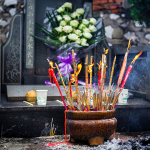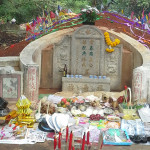Throughout the world, various cultures have ways of honoring departed family members and loved ones. Many of us in the west are family for All Saints’ and All Souls’ Days, which is a time to clean and decorated family graves with candles and flowers and offer prayers for them at home and in church. In Mexico and Central America altars erected for these Days of the Dead and can be quite elaborate and exquisitely beautiful. In the United States many people attend Memorial Day Parades in late May and plant flowers in cemeteries to honor deceased family members and especially veterans. These are all lovely and meaningful observances. In China and among Chinese émigré communities there exists an equally fascinating holiday celebrated in remembrance of the dead that is lesser known to westerners: Qingming.
Qingming (清明節) literally translates as The Festival of Pure Brightness, which is most likely a reference to the time of year when the celebration takes place, mid spring, when the weather becomes warm and the sun shines longer each day. More specifically Qingming falls of the 15th day after the Spring Equinox, so usually the 4th of 5th of April on the Gregorian calendar. On this day Chinese families sweep and clean the graves of their ancestors, a practice which has led the observance to be called Tomb Sweeping Day in the west. Offerings of spirit money and other papier mache items are burnt to ensure a wealthy afterlife for one’s departed loved ones. People also make offerings of food and incense and kowtow (bow deeply and touch their heads to the ground) in front for familial graves and ancestor altars in the home. Offerings are also made for the Hungry Ghosts, those who have nobody to pray for them, but there is a festival dedicated specifically to these needy souls that occurs later in the year, around the August full moon, and Qingming is more a time to honor and remember one’s own ancestors and friends who have left this world.
In order to understand such practices as offering food and money for the dead, it’s important to examine traditional Chinese Taoist beliefs regarding the afterlife. In Chinese folk religion the immediate afterlife resembles very much life on Earth and the more material goods and money one has, the more comfortable the afterlife will be. For this reason people hold elaborate funerals with a variety of papier mache offerings in the shape of mansions, servants and in more recent years sports cars and credit cards. Joss paper which is considered currency for the spirit world is also burned in large quantities at funerals and special festivals throughout the year to ensure one’s ancestors are well provided for. Curiously the denominations of spirit banknotes are astronomically high sometimes several billion dollars on a single note which is the source of a popular joke that states either everybody in the afterlife is extremely rich or inflation is a huge problem. This immediate afterlife is temporary, similar to the western concept of Purgatory, although it is not necessarily a place of penance and expiation, and after a certain period of time people are either reincarnated or pass on to Paradise where material offerings are no longer needed.
Shortly after its rise to power, the Chinese Communist Party outlawed Qingming observances and in fact all religious practices viewing them as superstitious and counterrevolutionary, but many citizens continued to celebrate traditional religious holidays in secret. The ban was only lifted in 2008 and today Qingming is a public holiday with free highway access nationwide and many companies offering bonuses to their employees. In Taiwan, Qingming has been somewhat politicized as it is the anniversary of the death of Chiang Kai-Shek, the nation’s first president and anti-communist leader. In Chinese communities abroad, Qingming serves as a means to remain connected with one’s past and cultural roots. Throughout China this day of mourning and celebration conjures up deep feelings as captured in this Tang Dynasty poem by the famous classical poet Du Mu:
| 清明時節雨紛紛 | 清明时节雨纷纷 | A drizzling rain falls on the Mourning Day; |
| 路上行人欲斷魂 | 路上行人欲断魂 | The mourner’s heart is breaking on his way. |
| 借問酒家何處有 | 借问酒家何处有 | Inquiring, where can a wineshop be found? |
| 牧童遙指杏花村 | 牧童遥指杏花村 | A cowherd points to Apricot Flower Village. |
I hope you’ve enjoyed reading about this beautiful day of remembrance and no matter what our cultural traditions and backgrounds, we can take an example from the beautiful observance of Qingming to pause for a moment any time of year to honor our ancestors and loved ones on the other side and bring to mind all the wonderful experiences we’ve shared with them.

